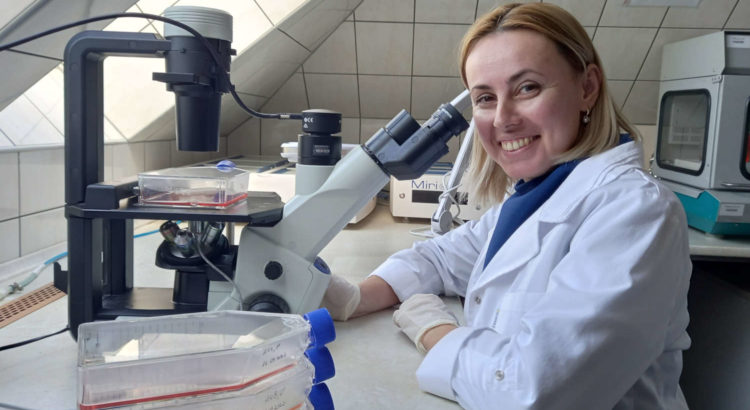Dr. Taisiia Yurchuk from the Department of Team of Reproductive Pathology and Translational Medicine at the Institute of Animal Reproduction and Food Research of the Polish Academy of Sciences in Olsztyn has received funding for the implementation of research projects under the NCN program for Ukrainian scientists.
NCN for Ukrainian Scientists is a special NCN program aimed at Ukrainian scientists, regardless of citizenship, who took or will take refuge in Poland after the Russian aggression against Ukraine. It is led by the National Science Center (NCN).
What will Dr. Yurchuk do at the Institute?
Dr. Taisiia Yurchuk will be involved in the NCN OPUS project „Biological research and mathematical modeling to describe and predict new processes controlling development, function, and atresia of bovine ovarian follicles”.
Dr. Yurchuk’s work will include but is not limited to: performing cell isolations and cultures and performing analyses using molecular biology techniques. Dr. Yurchuk will focus on modeling the process of normal and disrupted ovulation in cattle. Her findings may be used to create similar models in other animals and humans.
Why is this understanding of these mechanisms so important? Ovulation is the process of releasing an oocyte from ovarian follicles. After ovulation, in the early luteal phase, fertilization of the oocyte by the sperm can occuŕ. The factors that regulate ovarian follicle development, ovulation processes and their disorders (e.g., the phenomenon of multiple ovulations in animals with single ovulation), and oocyte quality are still unexplained.
In animal breeding (especially cattle), twin pregnancies are difficult to obtain by selection because of the low heritability of this trait, the long intergenerational period, and the unfavorable correlation with milk yield. A factor that may play a role in the appearance of higher twin pregnancy rates is the insulin-like growth factor (IGF-1). It has been shown that IGF-I plays an important role in the reproduction of cows, influences fertility, at different regulatory levels of the hypothalamic-pituitary-ovarian axis, and may condition double ovulation resulting in twin pregnancies. However, no data are describing the mechanisms that lead to twin pregnancies/double ovulation. The NCN-funded research will help change this.
The experiments will determine the effects of IGF-1 on the growth and function of ovarian follicle granular layer cells in vitro. In addition, genes and proteins involved in the process of necroptosis, one type of cell death, will be traced. In addition, the expression of non-coding RNAs, the so-called miRNAs, will be investigated to find new markers of follicle quality and indicators of double ovulation. The results obtained will be used to explain the occurrence of double ovulation and twin pregnancy cases in cattle breeding. In addition, in vitro experiments will be confirmed under in vivo conditions to compare the results obtained. The obtained results will be used to create a planned mathematical model of the above-described processes occurring in the ovary, especially the process of double ovulation.
A long way to Olsztyn
Dr. Taisiia Yurchuk became one of the first beneficiaries of the program to support scientists from Ukraine and received a 3-month scholarship from the Polish Academy of Sciences. On March 14, 2022, she started work at the Department of Immunology and Reproductive Pathology.
Dr. Taisiia Yurchuk, along with a group of scientists, doctors, and patients, sheltered for over a week in the basement of an infertility clinic and maternity hospital in Kharkiv, which was bombed by Russian aggressors. She finally managed to escape from Kharkiv and after more than a week’s journey across Ukraine she finally arrived in Olsztyn.
Dr. Yurchuk has previously worked at the Institute of Problems of Cryobiology and Cryomedicine in Kharkiv. Her scientific specialties are gamete biology, embryology, cell biology, and 3D cell culture systems. Dr. Yurchuk has been in contact with the Institute for several years. She has presented papers at scientific conferences organized by the Institute: including Biodiversity, and recently gave a lecture at the conference Development of Scientific Cooperation in Reproductive Medicine Research VIII, organized by the Department of Biology and Pathology of Human Reproduction in October 2021 in Wroclaw. Dr. Yurchuk participated in the 5th edition of the Symposium „Perspectives in Biodiversity Conservation” organized by the Institute of Animal Reproduction and Food Research of the Polish Academy of Sciences. She is a member of the Reproduction Committee.
